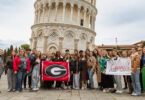Athens, Ga. – Michael Jennings of Princeton University will visit the University of Georgia to discuss German-Jewish cultural philosopher Walter Benjamin’s “Berlin Childhood around 1900” on April 8 from 3:30-6:35 p.m. in Room 144 of Park Hall. Part of the Seminars on Modernism series organized and hosted by Jed Rasula in the department of English, the lecture is open to the UGA community.
Jennings also will present a lecture on photography April 9 at 5 p.m. in room 250 of the Miller Learning Center. The talk on “The Secrets of the Darkened Chamber: Conflations of World and Apparatus in Michael Schmidt, Henry Fox Talbot and Walter Benjamin” is free and open to the public.
The photography lecture will consider both the history and the conceptual understanding of photography and place special emphasis on contemporary artist Michael Schmidt, a leading German photographer whose work has been widely exhibited in Germany and elsewhere, including in a 1996 exhibition at the Museum of Modern Art in New York.
One of the world’s leading Benjamin experts and a Class of 1900 Professor of Modern Languages and German, Jennings has published widely on modernism, Weimar culture and photography. He serves as general editor of the standard English-language edition of Benjamin’s works published by Harvard University Press and editor of a series of collections of Benjamin’s essays intended for classroom use, including “The Writer of Modern Life: Essays on Charles Baudelaire” (2007), “The Work of Art in the Age of its Technological Reproducibility and other Writings on Media” (2008) with Brigid Doherty and Thomas Levin and “One Way Street” (2013) with Miriam Bratu Hansen.
Jennings has a comprehensive intellectual biography of Walter Benjamin co-authored with Howard Eiland forthcoming from Harvard University Press this year.
A German literary critic, philosopher and essayist, Benjamin is best known for his work in aesthetic theory and his writings on the philosophy of history. He is generally associated with the critical theory of the Frankfurt School. Benjamin’s autobiographical “Berlin Childhood around 1900,” the subject of Jennings’ seminar, was written in the 1930s but not published until after Benjamin’s death. The book features individual memories of the author’s childhood in an affluent Jewish household in the West End of Berlin, which he presents in short prose pieces that invite the reader to both contemplate and critique the images Benjamin conjures.
“‘Berlin Childhood around 1900′ is a work of exile and as such a memorial to an irretrievably lost personal and social past,” said Martin Kagel, a UGA professor and head of the department of Germanic and Slavic studies. “It is beautifully written and also a very accessible text, which should make for a great seminar.”
Jennings’ visit is sponsored by the Franklin College of Arts and Sciences, the Jane and Harry Willson Center for Humanities and Arts, the Helen S. Lanier Chair and the department of Germanic and Slavic studies.






